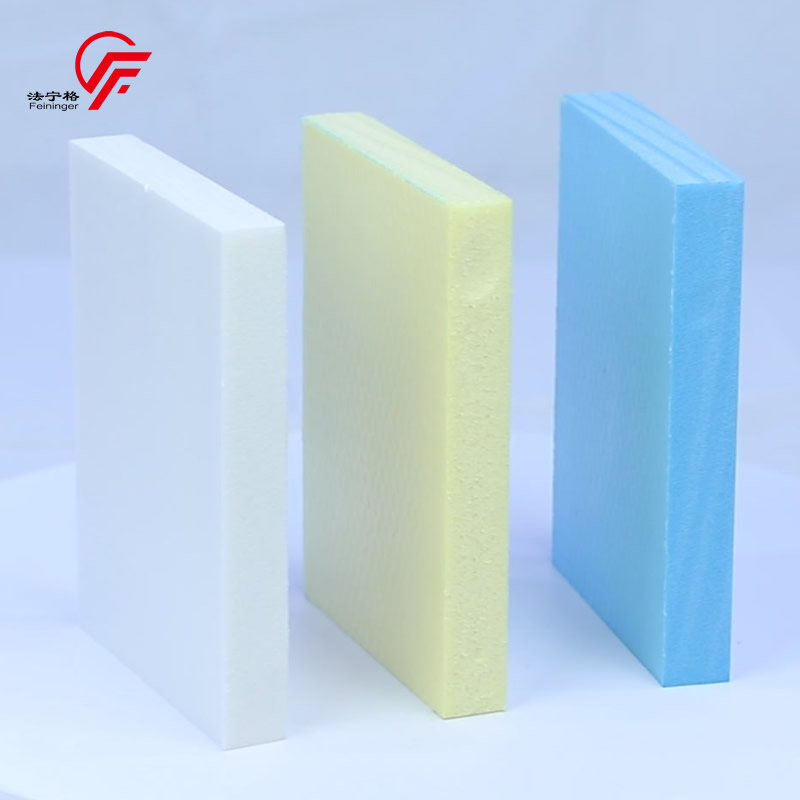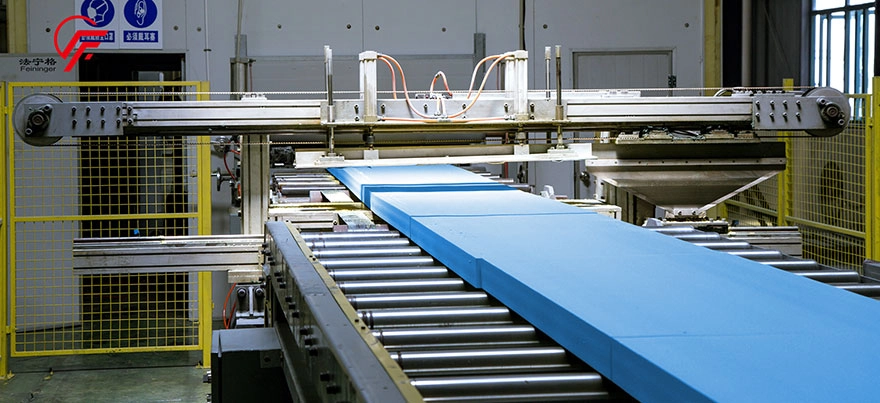XPS (Extruded Polystyrene) insulation foam is a high-performance material widely used in construction, refrigeration, and other industries due to its excellent thermal insulation properties, moisture resistance, and overall durability. This article explores the production process of XPS insulation foam, emphasizing the technological advancements behind its manufacturing, as well as the advantages of using this material in various applications. Additionally, we'll highlight Feininger's role as a leading XPS foam manufacturer, showcasing its state-of-the-art production line.
What is XPS Insulation Foam?
XPS insulation foam is an extruded material made from polystyrene, a type of plastic. It is produced by heating and expanding the raw material in a controlled environment, resulting in a dense, closed-cell structure that provides superior insulation. XPS foam is known for its high thermal resistance (low thermal conductivity), moisture resistance, compressive strength, and light weight, making it an ideal choice for a variety of applications, including:
Building Insulation: Walls, roofs, and floors in residential and commercial buildings.
Refrigeration: Insulation for cold storage units and refrigeration systems.
Packaging: Protective packaging for delicate items.
The closed-cell structure of XPS insulation foam also helps to reduce heat loss and prevents the absorption of water, thus extending the lifespan of buildings and products insulated with XPS.

The Raw Materials for XPS Insulation Foam Production
The production of XPS foam starts with the key raw material: polystyrene beads, which are often combined with blowing agents to create foam. Other additives like colorants, stabilizers, and flame retardants may also be included, depending on the application. These materials are carefully chosen to ensure that the final foam exhibits the desired properties such as high thermal insulation, durability, and moisture resistance.
Blowing agents, such as CO2 or pentane, are critical in the extrusion process as they help expand the foam, contributing to its closed-cell structure and improving its insulation capabilities. The combination of these materials is key to producing high-quality XPS foam boards.
The XPS Insulation Foam Production Process
Pre-expansion
The first step in the production of XPS insulation foam is pre-expansion. In this process, small polystyrene beads are expanded using steam, heat, and the blowing agent. This expansion gives the beads a cellular structure, increasing their volume and creating a foam-like texture. The pre-expanded beads are then collected and stored before the next step.
Extrusion Process
Next, the pre-expanded polystyrene beads are fed into an extruder, a large machine that applies heat and pressure to melt the beads into a uniform, molten mixture. The molten material is then forced through a die, where it cools and solidifies into sheets of foam. The blowing agent plays a crucial role in this step by expanding the molten mixture as it passes through the die, creating the foam's cellular structure.
The extrusion process ensures that the XPS foam is consistently shaped and molded to the required dimensions. The foam is then cooled and solidified to maintain its rigid structure, making it suitable for cutting into sheets.
Cooling and Cutting
Once the foam has been extruded, it passes through a cooling chamber, where it is allowed to cool and solidify. After cooling, the foam sheets are cut to the desired length and size using precision cutting systems. These cutting systems ensure that the foam sheets are consistent in size and meet the required specifications.
Surface Treatment
Finally, some manufacturers apply a surface treatment to the foam boards. This can include a coating or lamination process to enhance the foam's durability, increase UV resistance, and improve its overall performance in various environments. Surface treatments may also provide a smoother finish, making the foam easier to handle and install in construction applications.
Feininger XPS Foam Board Production Line
Feininger is a leading manufacturer of high-quality XPS insulation foam, known for its advanced production lines that utilize cutting-edge technology to produce superior foam boards. Their XPS foam board production line integrates the latest advancements in extrusion and molding technology to ensure consistent quality, efficient production, and high performance.
Technological Advantages of Feininger's Production Line
Energy-efficient Extrusion Technology: Feininger's production line features energy-efficient extruders that maintain precise temperature control. This results in foam boards with a consistent thickness and excellent insulation properties.
Customized Production Capabilities: Feininger offers flexibility in its production line, allowing for customized foam board sizes and densities to meet specific customer needs. Whether for building insulation or industrial applications, Feininger can tailor the product to ensure optimal performance.
High-precision Cutting Systems: Feininger employs automated cutting systems that ensure precise, clean edges on every foam board, enhancing the quality and consistency of the final product.
Environmental Sustainability: Feininger's production line incorporates eco-friendly practices, using non-toxic, environmentally friendly blowing agents. This not only meets industry regulations but also aligns with global sustainability trends.

Quality Control and Testing in XPS Foam Production
The quality of XPS insulation foam is critical to its performance, and rigorous quality control procedures are necessary throughout the production process. Feininger, for example, conducts comprehensive tests on each batch of foam to ensure it meets international quality standards.
Common tests include:
Thermal conductivity tests to measure the foam's insulation properties.
Compressive strength tests to ensure the foam can withstand pressure without deforming.
Moisture resistance tests to ensure the foam does not absorb water, which could compromise its performance.
By adhering to strict quality control measures, Feininger ensures that its XPS foam products provide long-lasting performance and reliability.
Advantages of XPS Insulation Foam in Construction
XPS insulation foam offers numerous benefits for construction and other industries:
High Thermal Insulation Properties: XPS foam has a low thermal conductivity, making it an excellent material for reducing energy consumption in buildings by providing effective thermal insulation.
Moisture Resistance: The closed-cell structure of XPS foam prevents water absorption, which can lead to mold growth or degradation of other building materials. This is especially important in areas with high humidity or water exposure.
Durability: XPS foam is highly durable and resistant to compression, ensuring it maintains its insulating properties for years.
Lightweight and Easy to Install: XPS foam boards are lightweight, making them easy to handle and install in various applications.
About Feininger: Leading XPS Foam Manufacturer
Feininger has established itself as a leading manufacturer of XPS insulation foam. With decades of experience and cutting-edge production lines, Feininger is a trusted supplier for businesses in need of high-quality foam insulation products. The company's commitment to quality, sustainability, and innovation makes it a preferred choice for construction and industrial projects worldwide.
Feininger's advanced XPS foam board production line and its dedication to customer satisfaction ensure that it continues to lead the industry in providing reliable, energy-efficient insulation solutions.
Conclusion
The production of XPS insulation foam is a sophisticated process that requires precision, advanced technology, and strict quality control. From raw materials to the final product, every step in the production process contributes to the foam's superior thermal insulation properties, moisture resistance, and overall durability. With Feininger's state-of-the-art production lines, businesses can rely on high-quality XPS foam that meets the demands of modern construction and industrial applications.
For more information or to request a quote for XPS insulation foam products, contact Feininger today to discover how their solutions can enhance your projects.

 Español
Español Pусский
Pусский
